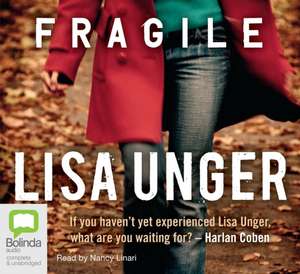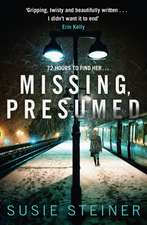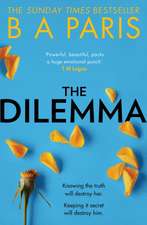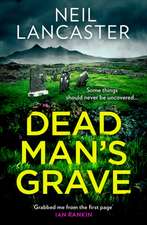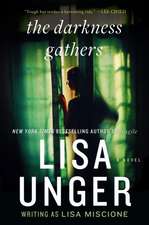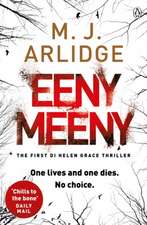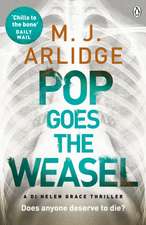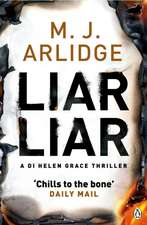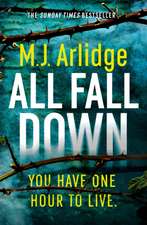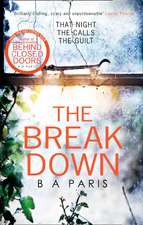Fragile: The Hollows
Autor Lisa Ungeren Limba Engleză CD-Audio – 31 aug 2010
Eerie parallels soon emerge between Charlene’s disappearance and the abduction of another local girl that shook the community years ago when Maggie was a teenager. The investigation has her husband, Jones, the lead detective on the case, acting strangely. Rick, already a brooding teenager, becomes even more withdrawn. In a town where the past is always present, nobody is above suspicion, not even a son in the eyes of his father.
“I know how a moment can spiral out of control,” Jones says to a shocked Maggie as he searches Rick’s room for incriminating evidence. “How the consequences of one careless action can cost you everything.”
As she tries to reassure him that Rick embodies his father in all of the important ways, Maggie realizes this might be exactly what Jones fears most. Determined to uncover the truth, Maggie pursues her own leads into Charlene’s disappearance and exposes a long-buried town secret—one that could destroy everything she holds dear. This thrilling novel about one community’s intricate yet fragile bonds will leave readers asking, How well do I know the people I love? and How far would I go to protect them?
From the Hardcover edition.
| Toate formatele și edițiile | Preț | Express |
|---|---|---|
| Paperback (2) | 51.46 lei 3-5 săpt. | +9.71 lei 7-13 zile |
| VINTAGE BOOKS – 30 iun 2011 | 51.46 lei 3-5 săpt. | +9.71 lei 7-13 zile |
| BROADWAY BOOKS – 30 apr 2011 | 113.56 lei 6-8 săpt. |
Preț: 138.69 lei
Nou
Puncte Express: 208
Preț estimativ în valută:
23.42€ • 24.45$ • 19.38£
23.42€ • 24.45$ • 19.38£
Indisponibil temporar
Doresc să fiu notificat când acest titlu va fi disponibil:
Se trimite...
Preluare comenzi: 021 569.72.76
Specificații
ISBN-13: 9781742673806
ISBN-10: 1742673805
Ediția:Simultaneous Release
Editura: Bolinda Publishing
Colecția The Hollows
Seria The Hollows
ISBN-10: 1742673805
Ediția:Simultaneous Release
Editura: Bolinda Publishing
Colecția The Hollows
Seria The Hollows
Notă biografică
Lisa Unger is an award-winning New York Times and international bestselling author. Her novels have sold over 1 million copies in the U.S. and have been translated into 26 different languages.
From the Hardcover edition.
From the Hardcover edition.
Extras
Prologue
When Jones Cooper was younger, he didn’t believe in mistakes. He thought that every road led you somewhere and wherever you wound up, that’s where you belonged. Regrets were for the shortsighted, for the small-minded. He didn’t believe that anymore. That was a young man’s arrogant way of looking at the world. And youth, among other things, had abandoned him long ago.
Jones felt the full weight of all his regrets as he pulled his Ford Explorer off the small side road and engaged the four-wheel drive to haul himself through the muck. Over the last week, the late autumn weather had been wild—hot one day, cold with flurries the next, then warm again. Now a thunderstorm loomed, as if heaven itself had decided to launch a protest against the erratic conditions. By morning, his tracks would be lost.
What had amazed him, what amazed him still, even after all these years, was how quickly he’d stepped out of himself. He’d slipped off every convention and moral that had defined him, a great cowl that fell to the floor with the unfastening of a single closure. The person beneath it was someone he barely recognized. He’d tried to tell himself over the years that the circumstances had changed him, that they’d forced him into aberrant behavior. But in his deepest heart, he knew. He knew what he was. He was weak. He was base. He always had been.
As he brought the vehicle to a stop, a white flash of lightning temporarily illuminated the area around him. He killed the engine and sat, drawing in a breath. In his pocket, his cell phone started vibrating. Hedidn’t have to look at it to know it was his wife; after so many good years with a woman, you knew when she was calling, even what she would probably say. He didn’t answer, but it set a clock ticking. He had about half an hour to call her back before she started trying other numbers. It wasn’t his habit to be out of communication. Not at this hour, early evening, when her last session had ended and, if there was nothing big going on, he’d be wrapping up the day.
It was the thought of that, the lost normalcy, that set Jones to sobbing. He was surprised at the force of it, like a hacking cough that came from deep in his chest, buckled him over so that his head was resting on the wheel. His wailing filled the car; he almost couldn’t believe the sound—animalistic in its agony—was coming from his body. But he couldn’t stop it. He had no choice but to surrender. Then it passed, as quickly as it had come on him, and he was left quaking in its wake. As he wiped his eyes, a heavy rain started to fall. Another lightning flash, and he felt the rumble of thunder beneath his feet.
He reached under the passenger seat, where he kept his heavy yellow slicker. He donned it while still in the car, pulling the hood tight around his face. Then he stepped outside, walked around to the hatch, and pulled it open, taking cover beneath it as he peered inside. The bundle in back was impossibly small. It was difficult to imagine that its contents represented everything dark and ugly within him, every wrong road, every cowardly choice. He didn’t want to touch it.
In his pocket, the phone started vibrating again. It broke his reverie, and he reached inside the vehicle to gather the thick gray plastic bag in both his arms. It no longer seemed small or insubstantial. It contained the weight of the whole world. He felt the horror of it all welling up within him, but he quashed it. He didn’t have time for more tears, or the luxury of breaking down again.
With the bag in his arms, Jones moved through the rain and ducked lithely beneath the crime scene tape to stand on the edge of a gaping hole. A Hollows kid, named Matty Bauer, had fallen into the abandoned mine shaft, which opened beneath his feet while he was playing with friends. In the fall, he’d broken his leg. It had taken police and rescue workers the better part of the day to get Matty out as the hole kept breaking down around them, showering the boy below with dirt.
Finally, they’d managed to get a tow truck out there. Jones had been the first to volunteer and was lowered on a rescue stretcher to immobilize the victim so he could be lifted out. Even though Jones was just back on duty, recovering from an injury himself, he had wanted to go.
When he’d gotten to the bottom of the hole, Matty Bauer was quiet and glassy-eyed, shock setting in, his leg twisted horribly. Even as he’d lifted Matty onto the stretcher, whispering assurances—Hang in there, kid, we’ve got you covered—the kid hadn’t made a sound. Then he’d watched as the stretcher lifted and lifted, spinning slowly like the hands of a clock against the circle of light above. He’d waited in that dark, deep hole for nearly twenty minutes, which seemed like hours, before they’d lowered the harness to lift him out. He’d done a lot of thinking down in that hole.
Take your time up there, guys.
Sorry, sir. Moving as fast as we can.
Which is apparently not very fucking fast.
But after the initial claustrophobic unease had passed, he’d felt oddly peaceful in the dark, some light washing in from above, voices echoing and bouncing down. He wasn’t worried about the walls collapsing and being buried alive. He might have even welcomed the hero’s death as opposed to the ignoble life he was living.
The shaft was scheduled for filling tomorrow at first light, the bulldozer and a great pile of earth already waiting. He’d left the station house saying to his assistant that he’d come here to check that everything was ready. He’d told her that he’d be here to supervise first thing in the morning. And that’s what he was doing.
Can’t have any more kids falling in that well. We’re lucky Matty just broke his leg.
Jones Cooper was a good cop. The Hollows was lucky to have him. Everyone said so.
Without false ceremony or empty words, he let the bundle drop from his arms and listened a second later to the soft thud of it landing in wet earth. Then he went back to the SUV and retrieved the shovel he always kept there. He spent a backbreaking twenty minutes shoveling dirt into the hole, just enough to cover even what he knew could not be seen from the rim of the opening. As he worked, the rain fell harder and great skeins of lightning slashed the sky.
One Month Earlier
1
The sound of the screen door slamming never failed to cause a happy lift in her heart that was immediately followed by a sinking, the opening of a small empty place. Maggie could almost hear her son the way he had been once—always running, always dirty from soccer, or riding his bike and getting into God knows what around the neighborhood. He’d be hungry or thirsty, would head directly to the refrigerator. Mom, I want a snack. He was loving then, ready to hug her or kiss her; not yet like his friends, who were even then slinking away from their mothers’ embraces, bearing their kisses as if they were vaccinations. He’d laughed easily. He was a clown, wanting her to laugh, too. Those days weren’t so long ago, when her son was still Ricky, not Rick. But that little boy was as far gone as if he’d gotten in a spaceship and flown to the moon.
Ricky walked into the kitchen, standing a full head taller than she, clad in black from head to toe—a pair of jeans, a carefully ripped and tattered tank, high-laced Doc Martens boots, though the autumn air was unseasonably hot. Nearly stifling, she thought, but that might just be her hormones. She was used to the silver hoop in his nose, almost thought it was cool.
“Hey, Mom.”
“Hi, baby.”
He started opening cupboards. She tried not to stare. She’d been standing at the counter, leafing through a catalog packed with junk no one needed. Out of the corner of her eye, she watched it. Yesterday, he’d come home with a tattoo, some kind of abstract tribal design that spanned the length of his upper arm. It was hideous. And it wasn’t done; there was just an outline with no color. It would take several more appointments to complete, and he had to earn the money to pay for it. She certainly wasn’t going to pay for him to mutilate himself, not that he’d asked for money. The skin around the ink looked raw and irritated, shone with the Vaseline he had over it for protection. The sight of it made her sick with grief.
All she could think of was how pure and unblemished, how soft and pink his baby skin had been. How his wonderful body, small and pristine, used to feel in her arms, how she’d kiss every inch of him, marveling at his beauty. When she was a new mom, she’d felt like she couldn’t pull her eyes away. Now she cast her eyes back at her catalog quickly, not wanting to look at her own son, at what he’d seen fit to do to his beautiful body.
The fight they’d all had yesterday was over; everything she needed to say, she’d said. He would be eighteen in three weeks. His body wasn’t her responsibility anymore. You have no right to try to control me, he’d spat at her. I’m not a child. He was right, of course. That’s what hurt most of all.
“Not a big deal, Mom,” he said, reading her mind. He was riffling through the mail on the counter. “Lots of people have tattoos.”
“Ricky,” she said. She felt the heat rise to her face. But instead of saying anything else, she released a long, slow breath. It was a thing, like so many things, that could never be undone. It would be on him forever. Maybe she’d stop seeing it, like his hair, which was always a different color, jet-black today. He walked over and kissed her on the head.
“Not a baby, Mom,” he said.
“Always my baby, Ricky,” she said. He tried to move away, but she caught him and gave him a quick squeeze, which he returned.
“Rick,” he said. He turned away from her and headed to the refrigerator.
“Always Ricky,” she said. She knew she was being silly and stubborn. He had a right to say what he wanted to be called, didn’t he? Hadn’t she taught him to speak up for himself, to establish his boundaries, to have respect for himself?
“Mom.” One word. It was a gentle admonishment, as well as a request that she lighten up a bit.
She smiled and felt some of her tension dissolve. No matter how sad, how angry she was, she and her son had the kind of chemistry that made it difficult to fight. They were as likely to dissolve into laughter as they were to slam doors or raise their voices. Unlike the chemistry Ricky had with his father. When her husband and son fought, she understood why world peace was impossible, why people wouldn’t someday just learn to get along.
“How’s the band doing?” she said. A change of subject would do them both good.
“Not great. Charlene and Slash had a fight; she smashed his guitar. He can’t afford another one. We don’t have any gigs lined up anyway. We might be taking a break.”
“Who’s Slash?”
“You know, Billy Lovett.”
“Oh.” Billy of the golden hair and sea green eyes, the charmer, the star soccer player, once upon a time the heartthrob of the fourth grade. He and Ricky were both seniors getting ready to graduate, unrecognizable by those fourth-grade pictures, taken when sunlight seemed to shine from their very pores. Now they looked more like they slept in coffins during the daylight hours. That Billy wanted to be called Slash was a new development.
“Sorry to hear that,” she said. Honestly, their band was awful. Charlene’s voice was middling at best. Ricky had been playing the drums since fourth grade. His technique was passable, but he didn’t have any real talent for it—not that Maggie could hear. Billy, aka Slash, was a fairly decent guitar player. But when they got together, they emitted a raucous, angry sound that inspired in Maggie an awkward cringing.
“Wow,” she’d said to them after she and Jones went to hear them perform last year at the school battle of the bands. They’d been in the final three but eventually lost to another, equally unpleasant-sounding band. “I’m impressed.”
Ricky poured himself a glass of orange juice, managing to spill a few drops on the granite countertop and the just-cleaned hardwood floor. She grabbed a rag and wiped up after him.
That’s the problem. You’re always following him around, cleaning up his messes. He thinks he can do anything. Her worst fights with her husband had been about their son, their only child. Jones didn’t seem to notice that their son, “the freak,” as Jones like to call him, had a 4.0 average and nearly perfect SAT scores. His early acceptance letters to Georgetown and New York University were hanging on the refrigerator, where she used to hang his crayon drawings and report cards. And those were just the first two.
What difference does any of that make when he doesn’t even want to go to college? All that brilliance and all he can think to do is get his fucking nose pierced?
But Maggie knew her son; he wouldn’t have gone through all the work of those applications as early as he had if there wasn’t someone beneath the punk hairstyle and tattoo who knew what an education meant. He didn’t want to work at the local music shop all his life.
“So are you and Charlene going to the winter formal?”
He flashed her a look, turning his too-smart eyes on her. They were black, black pools, just like her father’s eyes had been. Sometimes she saw her father’s strength, his wisdom, there, too. But mainly, she saw the twinkling before some smart comment or the flash of attitude. Like right now.
“You’re kidding,” he said.
“No,” she said, drawing out the word. “I’m not kidding. It might be fun.”
“Um, no, Mom. We’re not. Anyway, it’s not for months.”
“You could do it your own way, with your own style.” The rag still in her hand, she started wiping down things that didn’t need wiping—the chrome bread box, the toaster oven, the Italian pottery serving bowl where they kept the fresh fruit, when they had any in the house—which at the moment they did not. She really needed to go the grocery store. God forbid Jones or Ricky would ever pick up the list on the counter and go without being nagged for three days.
She wondered what “your own style” might mean to Ricky and Charlene. But all the other moms she ran into at the school or the grocery store were readying their daughters and sons for this high school event—shopping for dresses and renting tuxes already. Maggie could settle for gothic formal wear; she could handle that. She used to be cool a hundred years ago. She went to NYU, partied in the East Village—Pyramid Club, CBGB—wore all black. Her son’s style didn’t bother her as much as it did Jones. It was the whole college thing that kept her up at night. And Charlene, she worried about Charlene.
Charlene, a little girl lost, hiding behind a mask of black eyeliner and vamp red lipstick. She had an aura that somehow managed to be knowing but desperate, fiery yet vulnerable. She was the kind of girl who started wars, at once acquiescent and defiant. She’d spun a web around Maggie’s son without his knowing it, without even perhaps her intention. Spider silk was stronger than chain if you happened to be a fly.
There was something in the pitch of his voice when Ricky had first told her about Charlene that had made her stop what she was doing and listen, something about the look on his face. She knew it was going to be trouble.
Maggie kept waiting for the death knell: Mom, Charlene’s pregnant. We’re getting married. But she was smart enough to keep her mouth shut, to welcome Charlene into their home, into their family as much as Jones would allow. She wasn’t a bad girl. Maggie even saw a little of her younger self in Charlene. A little.
Maggie remembered how she’d railed and rebelled when her parents tried to keep her away from a boy she’d dated from a neighboring high school. Phillip Leblanc—with his punky hair and his paint-stained black clothes (he was an artist, of course), he was everything boys from The Hollows were not: cool, exotic, artistic. She did love him, in that way that teenage girls love, like a lemming. Which is not love, of course. Unfortunately, at seventeen, no one realizes that. And the only thing her parents accomplished with their endless groundings and tirades was to push her into his waiting arms. It was a big mess, from which she’d barely extricated herself. But that was another life. She still thought about him sometimes, wondered what became of him. Her random Google searches over the years had never turned anything up. He was a troubled boy, she realized now, and probably grew into a troubled man.
Even her mother had admitted recently, during one of Maggie’s laments about Charlene, that they’d handled it all wrong. Maggie was surprised, because her mother was generally not one to give an inch. But Mom was long on self-reflection these days—when she wasn’t obsessing about some noise in her attic.
Luckily, Jones recognized that when it came to Charlene, their son was standing on the edge of a cliff. Any sudden movement to help or control might cause a leap. They wouldn’t get him back.
That girl is sleeping with our son, he said to her one night as they sipped wine by the pool.
I know, she said, not without a twinge of something angry or jealous or sad. She’d seen Charlene with her hand on Ricky’s crotch just the day before. Somehow it made her remember changing his diapers and giving him a bath. She’d felt another lash of grief. Sometimes it seemed like that was all it was, motherhood—grief and guilt and fear. You said good-bye a little every day—from the minute they left your body until they left your home. But no, that wasn’t all. There was that love, that wrenching, impossible love. It was all so hard sometimes, hard enough with two careers that they hadn’t wanted another. But it was over so fast.
There’s something not right about that girl.
I know it, she said.
Jones cast her a surprised glance over the table. I thought you liked her.
She gave a slow shrug. I care about her because I care about Ricky. And he loves her.
With a sharp exhale: What does he know about love?
Not enough. That’s why it’s so dangerous.
From the Hardcover edition.
When Jones Cooper was younger, he didn’t believe in mistakes. He thought that every road led you somewhere and wherever you wound up, that’s where you belonged. Regrets were for the shortsighted, for the small-minded. He didn’t believe that anymore. That was a young man’s arrogant way of looking at the world. And youth, among other things, had abandoned him long ago.
Jones felt the full weight of all his regrets as he pulled his Ford Explorer off the small side road and engaged the four-wheel drive to haul himself through the muck. Over the last week, the late autumn weather had been wild—hot one day, cold with flurries the next, then warm again. Now a thunderstorm loomed, as if heaven itself had decided to launch a protest against the erratic conditions. By morning, his tracks would be lost.
What had amazed him, what amazed him still, even after all these years, was how quickly he’d stepped out of himself. He’d slipped off every convention and moral that had defined him, a great cowl that fell to the floor with the unfastening of a single closure. The person beneath it was someone he barely recognized. He’d tried to tell himself over the years that the circumstances had changed him, that they’d forced him into aberrant behavior. But in his deepest heart, he knew. He knew what he was. He was weak. He was base. He always had been.
As he brought the vehicle to a stop, a white flash of lightning temporarily illuminated the area around him. He killed the engine and sat, drawing in a breath. In his pocket, his cell phone started vibrating. Hedidn’t have to look at it to know it was his wife; after so many good years with a woman, you knew when she was calling, even what she would probably say. He didn’t answer, but it set a clock ticking. He had about half an hour to call her back before she started trying other numbers. It wasn’t his habit to be out of communication. Not at this hour, early evening, when her last session had ended and, if there was nothing big going on, he’d be wrapping up the day.
It was the thought of that, the lost normalcy, that set Jones to sobbing. He was surprised at the force of it, like a hacking cough that came from deep in his chest, buckled him over so that his head was resting on the wheel. His wailing filled the car; he almost couldn’t believe the sound—animalistic in its agony—was coming from his body. But he couldn’t stop it. He had no choice but to surrender. Then it passed, as quickly as it had come on him, and he was left quaking in its wake. As he wiped his eyes, a heavy rain started to fall. Another lightning flash, and he felt the rumble of thunder beneath his feet.
He reached under the passenger seat, where he kept his heavy yellow slicker. He donned it while still in the car, pulling the hood tight around his face. Then he stepped outside, walked around to the hatch, and pulled it open, taking cover beneath it as he peered inside. The bundle in back was impossibly small. It was difficult to imagine that its contents represented everything dark and ugly within him, every wrong road, every cowardly choice. He didn’t want to touch it.
In his pocket, the phone started vibrating again. It broke his reverie, and he reached inside the vehicle to gather the thick gray plastic bag in both his arms. It no longer seemed small or insubstantial. It contained the weight of the whole world. He felt the horror of it all welling up within him, but he quashed it. He didn’t have time for more tears, or the luxury of breaking down again.
With the bag in his arms, Jones moved through the rain and ducked lithely beneath the crime scene tape to stand on the edge of a gaping hole. A Hollows kid, named Matty Bauer, had fallen into the abandoned mine shaft, which opened beneath his feet while he was playing with friends. In the fall, he’d broken his leg. It had taken police and rescue workers the better part of the day to get Matty out as the hole kept breaking down around them, showering the boy below with dirt.
Finally, they’d managed to get a tow truck out there. Jones had been the first to volunteer and was lowered on a rescue stretcher to immobilize the victim so he could be lifted out. Even though Jones was just back on duty, recovering from an injury himself, he had wanted to go.
When he’d gotten to the bottom of the hole, Matty Bauer was quiet and glassy-eyed, shock setting in, his leg twisted horribly. Even as he’d lifted Matty onto the stretcher, whispering assurances—Hang in there, kid, we’ve got you covered—the kid hadn’t made a sound. Then he’d watched as the stretcher lifted and lifted, spinning slowly like the hands of a clock against the circle of light above. He’d waited in that dark, deep hole for nearly twenty minutes, which seemed like hours, before they’d lowered the harness to lift him out. He’d done a lot of thinking down in that hole.
Take your time up there, guys.
Sorry, sir. Moving as fast as we can.
Which is apparently not very fucking fast.
But after the initial claustrophobic unease had passed, he’d felt oddly peaceful in the dark, some light washing in from above, voices echoing and bouncing down. He wasn’t worried about the walls collapsing and being buried alive. He might have even welcomed the hero’s death as opposed to the ignoble life he was living.
The shaft was scheduled for filling tomorrow at first light, the bulldozer and a great pile of earth already waiting. He’d left the station house saying to his assistant that he’d come here to check that everything was ready. He’d told her that he’d be here to supervise first thing in the morning. And that’s what he was doing.
Can’t have any more kids falling in that well. We’re lucky Matty just broke his leg.
Jones Cooper was a good cop. The Hollows was lucky to have him. Everyone said so.
Without false ceremony or empty words, he let the bundle drop from his arms and listened a second later to the soft thud of it landing in wet earth. Then he went back to the SUV and retrieved the shovel he always kept there. He spent a backbreaking twenty minutes shoveling dirt into the hole, just enough to cover even what he knew could not be seen from the rim of the opening. As he worked, the rain fell harder and great skeins of lightning slashed the sky.
One Month Earlier
1
The sound of the screen door slamming never failed to cause a happy lift in her heart that was immediately followed by a sinking, the opening of a small empty place. Maggie could almost hear her son the way he had been once—always running, always dirty from soccer, or riding his bike and getting into God knows what around the neighborhood. He’d be hungry or thirsty, would head directly to the refrigerator. Mom, I want a snack. He was loving then, ready to hug her or kiss her; not yet like his friends, who were even then slinking away from their mothers’ embraces, bearing their kisses as if they were vaccinations. He’d laughed easily. He was a clown, wanting her to laugh, too. Those days weren’t so long ago, when her son was still Ricky, not Rick. But that little boy was as far gone as if he’d gotten in a spaceship and flown to the moon.
Ricky walked into the kitchen, standing a full head taller than she, clad in black from head to toe—a pair of jeans, a carefully ripped and tattered tank, high-laced Doc Martens boots, though the autumn air was unseasonably hot. Nearly stifling, she thought, but that might just be her hormones. She was used to the silver hoop in his nose, almost thought it was cool.
“Hey, Mom.”
“Hi, baby.”
He started opening cupboards. She tried not to stare. She’d been standing at the counter, leafing through a catalog packed with junk no one needed. Out of the corner of her eye, she watched it. Yesterday, he’d come home with a tattoo, some kind of abstract tribal design that spanned the length of his upper arm. It was hideous. And it wasn’t done; there was just an outline with no color. It would take several more appointments to complete, and he had to earn the money to pay for it. She certainly wasn’t going to pay for him to mutilate himself, not that he’d asked for money. The skin around the ink looked raw and irritated, shone with the Vaseline he had over it for protection. The sight of it made her sick with grief.
All she could think of was how pure and unblemished, how soft and pink his baby skin had been. How his wonderful body, small and pristine, used to feel in her arms, how she’d kiss every inch of him, marveling at his beauty. When she was a new mom, she’d felt like she couldn’t pull her eyes away. Now she cast her eyes back at her catalog quickly, not wanting to look at her own son, at what he’d seen fit to do to his beautiful body.
The fight they’d all had yesterday was over; everything she needed to say, she’d said. He would be eighteen in three weeks. His body wasn’t her responsibility anymore. You have no right to try to control me, he’d spat at her. I’m not a child. He was right, of course. That’s what hurt most of all.
“Not a big deal, Mom,” he said, reading her mind. He was riffling through the mail on the counter. “Lots of people have tattoos.”
“Ricky,” she said. She felt the heat rise to her face. But instead of saying anything else, she released a long, slow breath. It was a thing, like so many things, that could never be undone. It would be on him forever. Maybe she’d stop seeing it, like his hair, which was always a different color, jet-black today. He walked over and kissed her on the head.
“Not a baby, Mom,” he said.
“Always my baby, Ricky,” she said. He tried to move away, but she caught him and gave him a quick squeeze, which he returned.
“Rick,” he said. He turned away from her and headed to the refrigerator.
“Always Ricky,” she said. She knew she was being silly and stubborn. He had a right to say what he wanted to be called, didn’t he? Hadn’t she taught him to speak up for himself, to establish his boundaries, to have respect for himself?
“Mom.” One word. It was a gentle admonishment, as well as a request that she lighten up a bit.
She smiled and felt some of her tension dissolve. No matter how sad, how angry she was, she and her son had the kind of chemistry that made it difficult to fight. They were as likely to dissolve into laughter as they were to slam doors or raise their voices. Unlike the chemistry Ricky had with his father. When her husband and son fought, she understood why world peace was impossible, why people wouldn’t someday just learn to get along.
“How’s the band doing?” she said. A change of subject would do them both good.
“Not great. Charlene and Slash had a fight; she smashed his guitar. He can’t afford another one. We don’t have any gigs lined up anyway. We might be taking a break.”
“Who’s Slash?”
“You know, Billy Lovett.”
“Oh.” Billy of the golden hair and sea green eyes, the charmer, the star soccer player, once upon a time the heartthrob of the fourth grade. He and Ricky were both seniors getting ready to graduate, unrecognizable by those fourth-grade pictures, taken when sunlight seemed to shine from their very pores. Now they looked more like they slept in coffins during the daylight hours. That Billy wanted to be called Slash was a new development.
“Sorry to hear that,” she said. Honestly, their band was awful. Charlene’s voice was middling at best. Ricky had been playing the drums since fourth grade. His technique was passable, but he didn’t have any real talent for it—not that Maggie could hear. Billy, aka Slash, was a fairly decent guitar player. But when they got together, they emitted a raucous, angry sound that inspired in Maggie an awkward cringing.
“Wow,” she’d said to them after she and Jones went to hear them perform last year at the school battle of the bands. They’d been in the final three but eventually lost to another, equally unpleasant-sounding band. “I’m impressed.”
Ricky poured himself a glass of orange juice, managing to spill a few drops on the granite countertop and the just-cleaned hardwood floor. She grabbed a rag and wiped up after him.
That’s the problem. You’re always following him around, cleaning up his messes. He thinks he can do anything. Her worst fights with her husband had been about their son, their only child. Jones didn’t seem to notice that their son, “the freak,” as Jones like to call him, had a 4.0 average and nearly perfect SAT scores. His early acceptance letters to Georgetown and New York University were hanging on the refrigerator, where she used to hang his crayon drawings and report cards. And those were just the first two.
What difference does any of that make when he doesn’t even want to go to college? All that brilliance and all he can think to do is get his fucking nose pierced?
But Maggie knew her son; he wouldn’t have gone through all the work of those applications as early as he had if there wasn’t someone beneath the punk hairstyle and tattoo who knew what an education meant. He didn’t want to work at the local music shop all his life.
“So are you and Charlene going to the winter formal?”
He flashed her a look, turning his too-smart eyes on her. They were black, black pools, just like her father’s eyes had been. Sometimes she saw her father’s strength, his wisdom, there, too. But mainly, she saw the twinkling before some smart comment or the flash of attitude. Like right now.
“You’re kidding,” he said.
“No,” she said, drawing out the word. “I’m not kidding. It might be fun.”
“Um, no, Mom. We’re not. Anyway, it’s not for months.”
“You could do it your own way, with your own style.” The rag still in her hand, she started wiping down things that didn’t need wiping—the chrome bread box, the toaster oven, the Italian pottery serving bowl where they kept the fresh fruit, when they had any in the house—which at the moment they did not. She really needed to go the grocery store. God forbid Jones or Ricky would ever pick up the list on the counter and go without being nagged for three days.
She wondered what “your own style” might mean to Ricky and Charlene. But all the other moms she ran into at the school or the grocery store were readying their daughters and sons for this high school event—shopping for dresses and renting tuxes already. Maggie could settle for gothic formal wear; she could handle that. She used to be cool a hundred years ago. She went to NYU, partied in the East Village—Pyramid Club, CBGB—wore all black. Her son’s style didn’t bother her as much as it did Jones. It was the whole college thing that kept her up at night. And Charlene, she worried about Charlene.
Charlene, a little girl lost, hiding behind a mask of black eyeliner and vamp red lipstick. She had an aura that somehow managed to be knowing but desperate, fiery yet vulnerable. She was the kind of girl who started wars, at once acquiescent and defiant. She’d spun a web around Maggie’s son without his knowing it, without even perhaps her intention. Spider silk was stronger than chain if you happened to be a fly.
There was something in the pitch of his voice when Ricky had first told her about Charlene that had made her stop what she was doing and listen, something about the look on his face. She knew it was going to be trouble.
Maggie kept waiting for the death knell: Mom, Charlene’s pregnant. We’re getting married. But she was smart enough to keep her mouth shut, to welcome Charlene into their home, into their family as much as Jones would allow. She wasn’t a bad girl. Maggie even saw a little of her younger self in Charlene. A little.
Maggie remembered how she’d railed and rebelled when her parents tried to keep her away from a boy she’d dated from a neighboring high school. Phillip Leblanc—with his punky hair and his paint-stained black clothes (he was an artist, of course), he was everything boys from The Hollows were not: cool, exotic, artistic. She did love him, in that way that teenage girls love, like a lemming. Which is not love, of course. Unfortunately, at seventeen, no one realizes that. And the only thing her parents accomplished with their endless groundings and tirades was to push her into his waiting arms. It was a big mess, from which she’d barely extricated herself. But that was another life. She still thought about him sometimes, wondered what became of him. Her random Google searches over the years had never turned anything up. He was a troubled boy, she realized now, and probably grew into a troubled man.
Even her mother had admitted recently, during one of Maggie’s laments about Charlene, that they’d handled it all wrong. Maggie was surprised, because her mother was generally not one to give an inch. But Mom was long on self-reflection these days—when she wasn’t obsessing about some noise in her attic.
Luckily, Jones recognized that when it came to Charlene, their son was standing on the edge of a cliff. Any sudden movement to help or control might cause a leap. They wouldn’t get him back.
That girl is sleeping with our son, he said to her one night as they sipped wine by the pool.
I know, she said, not without a twinge of something angry or jealous or sad. She’d seen Charlene with her hand on Ricky’s crotch just the day before. Somehow it made her remember changing his diapers and giving him a bath. She’d felt another lash of grief. Sometimes it seemed like that was all it was, motherhood—grief and guilt and fear. You said good-bye a little every day—from the minute they left your body until they left your home. But no, that wasn’t all. There was that love, that wrenching, impossible love. It was all so hard sometimes, hard enough with two careers that they hadn’t wanted another. But it was over so fast.
There’s something not right about that girl.
I know it, she said.
Jones cast her a surprised glance over the table. I thought you liked her.
She gave a slow shrug. I care about her because I care about Ricky. And he loves her.
With a sharp exhale: What does he know about love?
Not enough. That’s why it’s so dangerous.
From the Hardcover edition.
Recenzii
"[A] nail-biting nuanced whodunit."
—People
"Folks in a small town descend into darkness and revisit long forgotten memories when a young girl disappears....[A] simmering, tragic tale. Fans of authors like Jodi Picoult will want to read this one in a nice comfortable chair....Unger's fans won't be disappointed.”
—Associated Press
"This one is a stunner...Unger’s genius is in plotting the story so that the reader never knows what’s coming next...This is a read that will stay with you."
—New York Journal of Books Review
"Unger skillfully builds suspense by alternating point of view from chapter to chapter... Too many thrillers rely on coincidence or outlandish twists to connect the dots in a crime investigation, but Unger makes that process organic by using the interconnectedness of her characters' lives over the decades — these people really do know each others' secrets. Even apparently unrelated threads — like the chapters about the exterminator called in to trap the raccoons in Elizabeth's attic — are cleverly woven into the plot. Unger is also adept at drawing believable characters and relationships. Much of the emotional weight and considerable tension of Fragile have to do with families, with how parents and their children relate (or don't) and how husbands and wives can think they know everything about each other — and then find themselves surprised."
—St. Petersburg Times
"If you're a fan of Jodi Picoult's family chronicle storytelling, you'll enjoy Fragile, too. It's set in a small affluent town outside New York, where everyone knows someone who kissed the pizza guy once and many have ugly memories and buried secrets. When a teenage girl goes missing, the lives of all who knew her unravel. Unger balances nicely the suspense of her missing person story (a layered one when the vanishing of another teenage girl 30 years earlier is connected) with deeper sentiments. How do you live in the present when the past has broken you?"
—Milwaukee Journal Sentinel
"Best-selling author Lisa Unger has made her mark with a string of successful thrillers —Beautiful Lies, Black Out, and Die for You. While her new novel, Fragile, has a mystery (or three) and often unfurls with page-turning suspense, it also mines the more intimate territory of family and community dynamics, inspired by the disappearance and murder of one of Unger’s own schoolmates more than two decades ago... In the style of Jodi Picoult, Fragile tells its tale through the real-time action and freighted recollections of a diverse cast of characters living in fictional The Hollows, a small town 100 miles outside New York City with a reputation for quaint charm. In reality, The Hollows is rife with dysfunction, full ofugly memories and buried secrets."
—Boston Globe
"The never forgotten, complicated, and sometimes dangerous entanglements that can arise from growing up in a small town are compassionately and insightfully portrayed by this new suspense thriller from Unger. Perfectly balancing the need for independence from one's past and the indelible ties that persist regardless of any attempt otherwise, Unger creates a tale that's full of realistic characters that will remind readers of either someone they know, or perhaps even themselves. And filled with perfectly written passages that are worthy of being read twice also serve to make this read an intense journey that evokes a surprising amount of emotion. As does the beautifully written side-story involving the man (and his new love) who will eventually provide important clues in the case. Unger reminds us with a persistent grace that while the past is physically over, it remains a part of who we are. Poetic at times, heartbreaking at others, and suspenseful throughout, this is easily the best book of the year and comes with the strongest recommendation we have."
—New Mystery Reader
"Lisa Unger writes psychologically in-depth stories with great characters. The plot is fast-paced and has many twists."
—Daily American
"While Lisa Unger shows amazing skill at plot development, pacing, and projecting a rich sense of place, her talent in characterization - in plumbing the depths of her characters' inner circumstances - is truly exceptional... Though something of a departure from her recent thrillers, Lisa Unger's FRAGILE shines with her signature talent and generates plenty of suspense."
—Florida Weekly
"Lisa Unger brings this little town alive with flourish, probing the tragedies and the victories of the citizens of The Hollows. Each character has a multi-layered complexity and his or her own dangerous flaw unseen in most novels. Unger, the bestselling author of BEAUTIFUL LIES, SLIVER OF TRUTH, BLACK OUT and DIE FOR YOU, has a rare talent for exploring the vast pallet of human emotions, and she wraps that talent around a highly intriguing story."
—Bookreporter.com
"A rich tapestry of psychological wounds...Cleverly plotted and emotionally engaging."
—Kirkus Reviews
"Compelling and true to life characters...highly recommended."
—Library Journal
"Unger’s taut and edgy tale stealthily plumbs the depths of desperation that grow more dangerous with the passage of time."
—Booklist
"FRAGILE delivers everything that Lisa Unger's readers have come to expect — a thrilling story that affects complicated and nuanced people. But it's also a sensitive meditation on the very nature of family and community and the ties that bind us to one another."
—Laura Lippman, New York Times bestselling author of LIFE SENTENCES
Praise for Lisa Unger
“Perfect pitch, characters we can recognize as versions of ourselves, a plot in which a vague sense of suspense almost instantly appears and then grows with the speed of a waterslide . . . Lip-smacking good.” -
—Chicago Tribune
“The book’s characters are fully formed, and the action is depicted with satisfying breathlessness. . . . So well executed.”
—San Francisco Chronicle
“Compulsive reading.”
—New York Daily News
“A complex and gripping story about the dark side of the best of intentions.”
—St. Petersburg Times
“Fast-paced action coupled with marvelous character development.”
—Roanoke Times
“Lisa Unger writes with sharp psychological insight and bone-deep understanding of her characters.”
—Luanne Rice, author of Last Kiss and The Geometry of Sisters
From the Hardcover edition.
—People
"Folks in a small town descend into darkness and revisit long forgotten memories when a young girl disappears....[A] simmering, tragic tale. Fans of authors like Jodi Picoult will want to read this one in a nice comfortable chair....Unger's fans won't be disappointed.”
—Associated Press
"This one is a stunner...Unger’s genius is in plotting the story so that the reader never knows what’s coming next...This is a read that will stay with you."
—New York Journal of Books Review
"Unger skillfully builds suspense by alternating point of view from chapter to chapter... Too many thrillers rely on coincidence or outlandish twists to connect the dots in a crime investigation, but Unger makes that process organic by using the interconnectedness of her characters' lives over the decades — these people really do know each others' secrets. Even apparently unrelated threads — like the chapters about the exterminator called in to trap the raccoons in Elizabeth's attic — are cleverly woven into the plot. Unger is also adept at drawing believable characters and relationships. Much of the emotional weight and considerable tension of Fragile have to do with families, with how parents and their children relate (or don't) and how husbands and wives can think they know everything about each other — and then find themselves surprised."
—St. Petersburg Times
"If you're a fan of Jodi Picoult's family chronicle storytelling, you'll enjoy Fragile, too. It's set in a small affluent town outside New York, where everyone knows someone who kissed the pizza guy once and many have ugly memories and buried secrets. When a teenage girl goes missing, the lives of all who knew her unravel. Unger balances nicely the suspense of her missing person story (a layered one when the vanishing of another teenage girl 30 years earlier is connected) with deeper sentiments. How do you live in the present when the past has broken you?"
—Milwaukee Journal Sentinel
"Best-selling author Lisa Unger has made her mark with a string of successful thrillers —Beautiful Lies, Black Out, and Die for You. While her new novel, Fragile, has a mystery (or three) and often unfurls with page-turning suspense, it also mines the more intimate territory of family and community dynamics, inspired by the disappearance and murder of one of Unger’s own schoolmates more than two decades ago... In the style of Jodi Picoult, Fragile tells its tale through the real-time action and freighted recollections of a diverse cast of characters living in fictional The Hollows, a small town 100 miles outside New York City with a reputation for quaint charm. In reality, The Hollows is rife with dysfunction, full ofugly memories and buried secrets."
—Boston Globe
"The never forgotten, complicated, and sometimes dangerous entanglements that can arise from growing up in a small town are compassionately and insightfully portrayed by this new suspense thriller from Unger. Perfectly balancing the need for independence from one's past and the indelible ties that persist regardless of any attempt otherwise, Unger creates a tale that's full of realistic characters that will remind readers of either someone they know, or perhaps even themselves. And filled with perfectly written passages that are worthy of being read twice also serve to make this read an intense journey that evokes a surprising amount of emotion. As does the beautifully written side-story involving the man (and his new love) who will eventually provide important clues in the case. Unger reminds us with a persistent grace that while the past is physically over, it remains a part of who we are. Poetic at times, heartbreaking at others, and suspenseful throughout, this is easily the best book of the year and comes with the strongest recommendation we have."
—New Mystery Reader
"Lisa Unger writes psychologically in-depth stories with great characters. The plot is fast-paced and has many twists."
—Daily American
"While Lisa Unger shows amazing skill at plot development, pacing, and projecting a rich sense of place, her talent in characterization - in plumbing the depths of her characters' inner circumstances - is truly exceptional... Though something of a departure from her recent thrillers, Lisa Unger's FRAGILE shines with her signature talent and generates plenty of suspense."
—Florida Weekly
"Lisa Unger brings this little town alive with flourish, probing the tragedies and the victories of the citizens of The Hollows. Each character has a multi-layered complexity and his or her own dangerous flaw unseen in most novels. Unger, the bestselling author of BEAUTIFUL LIES, SLIVER OF TRUTH, BLACK OUT and DIE FOR YOU, has a rare talent for exploring the vast pallet of human emotions, and she wraps that talent around a highly intriguing story."
—Bookreporter.com
"A rich tapestry of psychological wounds...Cleverly plotted and emotionally engaging."
—Kirkus Reviews
"Compelling and true to life characters...highly recommended."
—Library Journal
"Unger’s taut and edgy tale stealthily plumbs the depths of desperation that grow more dangerous with the passage of time."
—Booklist
"FRAGILE delivers everything that Lisa Unger's readers have come to expect — a thrilling story that affects complicated and nuanced people. But it's also a sensitive meditation on the very nature of family and community and the ties that bind us to one another."
—Laura Lippman, New York Times bestselling author of LIFE SENTENCES
Praise for Lisa Unger
“Perfect pitch, characters we can recognize as versions of ourselves, a plot in which a vague sense of suspense almost instantly appears and then grows with the speed of a waterslide . . . Lip-smacking good.” -
—Chicago Tribune
“The book’s characters are fully formed, and the action is depicted with satisfying breathlessness. . . . So well executed.”
—San Francisco Chronicle
“Compulsive reading.”
—New York Daily News
“A complex and gripping story about the dark side of the best of intentions.”
—St. Petersburg Times
“Fast-paced action coupled with marvelous character development.”
—Roanoke Times
“Lisa Unger writes with sharp psychological insight and bone-deep understanding of her characters.”
—Luanne Rice, author of Last Kiss and The Geometry of Sisters
From the Hardcover edition.
